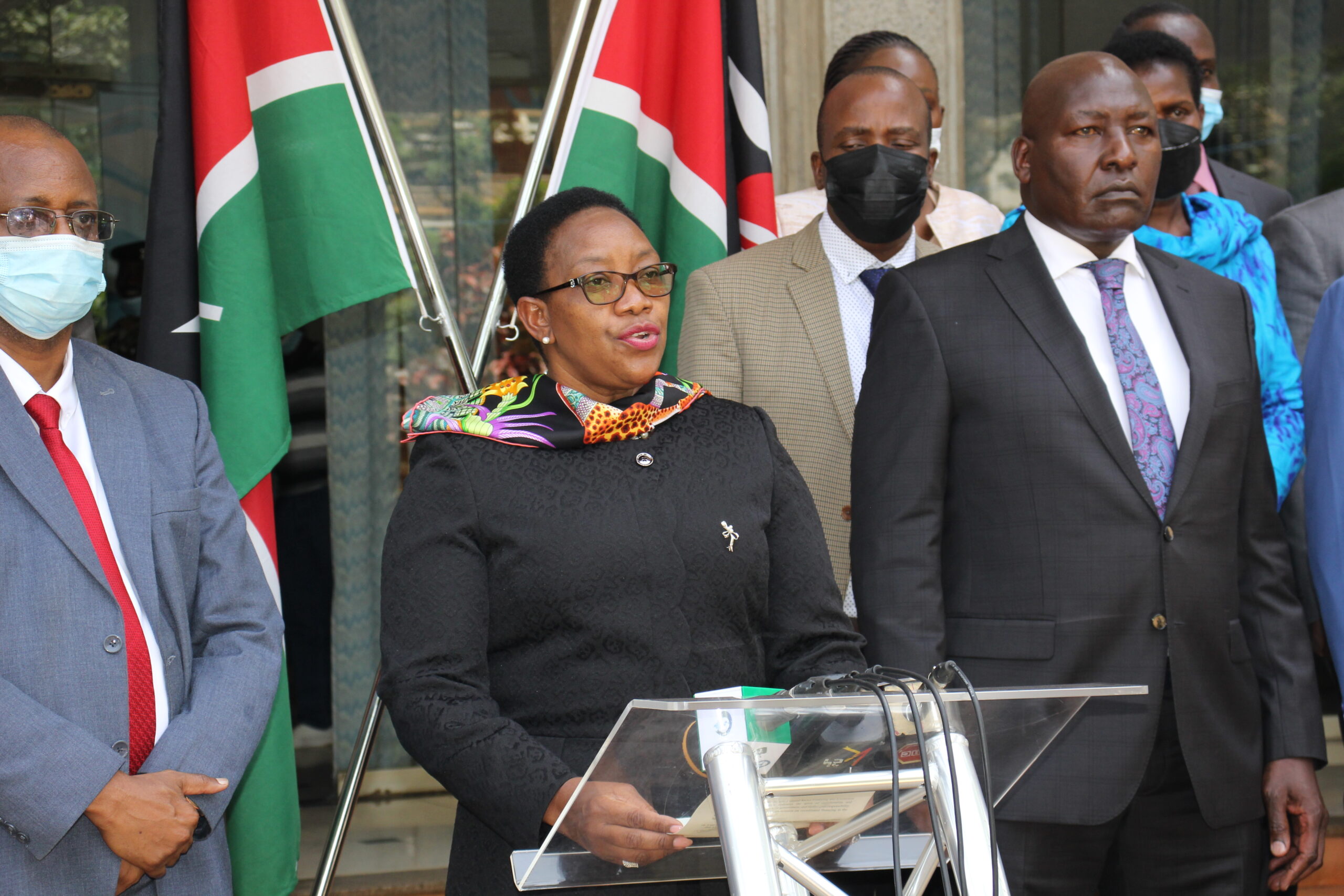
The Ministry’s core mandate is to implement the constitutional requirement on article 43(b), (c), and (d) on right to reasonable standards of sanitation, freedom from hunger, and to have adequate food of acceptable quality, and to clean safe water in adequate quantities.
The National Water coverage has increased from 53.3% in 2013 (27.7 Million People) to the current coverage of about 70% serving 34.8 Million people. This indicates that 12m additional people have access to clean water. Sewerage coverage has increased from 22.1% to 29% in urban areas. The Ministry plans to
increase the coverage to 80% and 40% respectively by 2022 including improving access to food security. The sector aims to achieve 100% water coverage both in urban and rural areas, 40% for urban sewerage 60% for the non-sewered system for urban sanitation, and 100% for rural sanitation by 2030.
To achieve the three basic human rights, the Ministry has embarked on the implementation of many Water, Sanitation, and Irrigation projects across the Country. The Ministry had a portfolio of 685 Projects by June 2020 spread across the country of which 113 number were completed by December 2021 through the 3 rd and 4 th wave RRI. The current portfolio is estimated at approximately 650 ongoing projects as of December 2021.
In the past, the completion rate of projects has been very low as projects take long to be completed leading to cost overruns and frustration by the people the projects are expected to serve.
Examples of projects the Ministry has completed include: – Dongo Kundu Water Supply Project (Phase I), Naivasha Industrial Park, Mavoko Water Supply and connected health Centres to Water supply, Nyamira, Kisii Vihiga Cluster, Homa Bay Cluster, Narok Sewerage, Carissa Sewerage, Wamba Water Project and more across the country. These projects are in support of the manufacturing and health pillars in the BIG FOUR AGENDA.
Three (3) Peace dams and water harvesting projects have been completed including the Nakuetum, Forolle Mega Peace Dam, Yamo Dam, and Wamba. The Ministry has fast-tracked the implementation of key flagship projects; Thwake Dam (64%), Karimenu Dam (76%), Galana Kulalu (74%), Thiba (84%), Bura Irrigation Project (45%), Lower Nzoia Irrigation Project (50%), Chemususu Water Supply (93%), and Northern Collector (99%).
In addition, we have fast-tracked the processing of new projects that include Mwache Dam in Kwale County, Ruiru II Dam, Kericho and Kisii Waste Water Management, Kisumu Sanitation Project, Nakuru Biodiversity project, Bute Dam in Wajir, Kamumu dam in Embu among others. The projects will lead to the progressive realization of the human right to water and sanitation.
The Rapid Result Initiative being a result based process aimed at fast-tracking implementation of the Ministry’s priority programs has been successfully adopted by the Ministry to achieve results both in increasing the Project Completion Rate, gaining value for money on investments, and ensuring quality in
completed works.
The 3rd Wave RRI ran between 19 to February 2021 up to 30th May 2021. This wave brought 44 projects (31 water and 13 irrigation projects) to completion increasing 1.5M persons with access to safe drinking water and a total of 4,870Acres of land being brought under irrigation.
The 4th wave ran between 22 and August up to 30th November 2021 and resulted in 19 Projects being completed an area of 6,210 acres brought under irrigation and additional 170,160 people gaining access to safe drinking water.
The 5th Wave running between 1st February up to 12th May 2022 intends to bring an increase of area under irrigation by 8,257 acres serving 6,880 households by completing 69 projects. A total of 3,317,297 persons are planned to access safe drinking water during this 5th Wave RRI.
There are 63 projects to be commissioned and handed over under this wave to benefit 2,730,265 persons to access safe drinking water and an area of 36,495 acres will be put under irrigation benefitting 44,300 Households.
WATER SECTOR REFORMS
The National Water Policy was approved by National Assembly on 14th October 2021 as Sessional Paper No. 1 of 2021. This policy will guide the Sector in ensuring good governance, and acceleration of access to water supply and sanitation services to progressively realize universal access while also ensuring gender mainstreaming, climate change, and education in the sector are achieved.
The Water Sector regulations: Water Services Regulations, Water Resources regulations, and Water Harvesting and Storage Regulations have also been officially gazetted. This will ensure that the sector is well regulated and both the water resources and services are sustainable and affordable. The Irrigation General Regulations have been developed and will ensure that the sector is well-coordinated, quality is assured, resources are mobilized and the irrigation sector is stable.
The Sector Strategies: Water Services Strategy, Water Resources Strategy, and Water Harvesting and Storage Strategy have further been developed to guide development in the sector for the next 5 years. The Irrigation Strategy is at an advanced stage which will enhance the planning of the irrigation subsector,
whereas the Irrigation Guidelines have been developed and are accessible from the Ministry’s website
These are further supported by the newly signed Sector Financing and Investment Framework (NAWASIP) which embraces the spirit of collaboration and consultation between the two levels of government, and further puts responsibility and commitments on each level of government on coordinated financing in the Sector.
Finally, the CS stated that she is happy that NAWASIP will realize the establishment of a Conditional Grant
that will ensure sustainable financing of the Water Sector. The Ministry is fast-tracking the finalization of the KEWI Act, Water Act 2016 miscellaneous amendments bill, and Sanitation Management Policy.

Leave a Reply